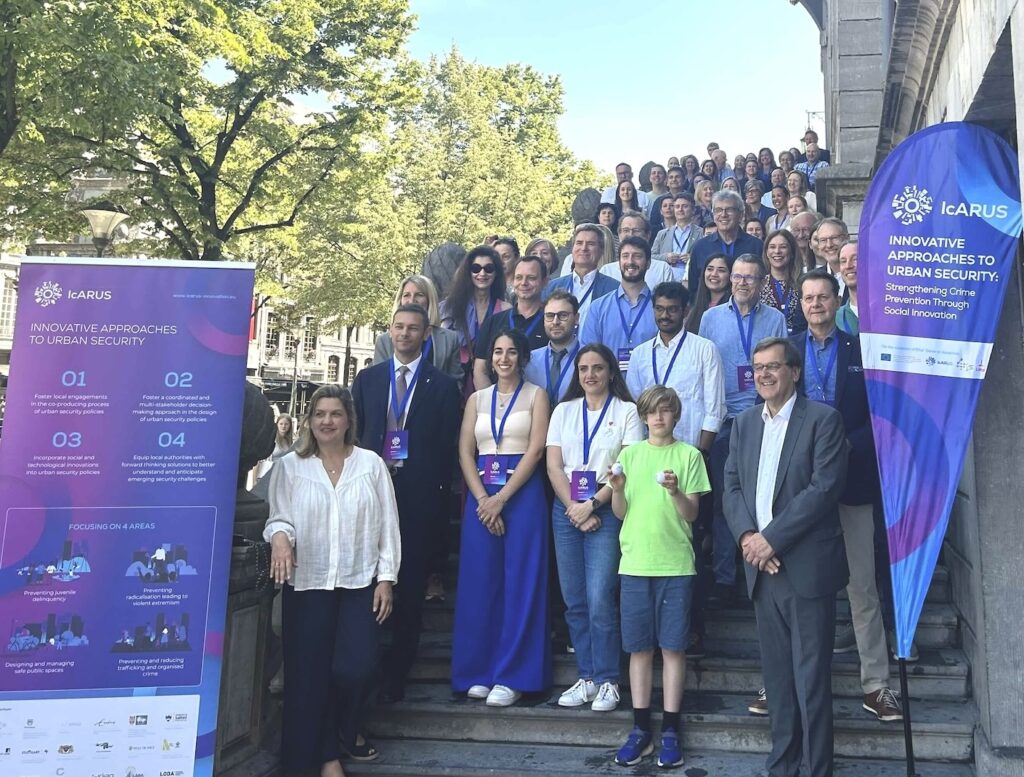Month: September 2024
Factsheet: Gender Inclusivity
The (en)gendering of urban security is a key trend in urban security, as highlighted by the IcARUS State of the Art Review. This evidenced the extensive and growing research that identifies the multiple ways in which gender plays a key role in how people perceive, experience, and produce security. Yet, it also revealed how this has largely failed to be translated into current urban security policies and programmes, in particular with regard to juvenile delinquency, radicalisation, safe public spaces and organised crime.
Both gender specific tools and gender specific indicators have been absent from much of the discussion, leaving a critical gap in our understanding, implementation, and evaluation of urban security policy.

Final press release: The IcARUS Project Concludes with Innovative Urban Security Solutions That Will Continue to Shape European Cities

FOR IMMEDIATE RELEASE
The IcARUS Project Concludes with Innovative Urban Security Solutions That Will Continue to Shape European Cities
Date: 30/8/24
Contact: alexandros@loba.com; nourry@urbansecurity.org;
Website: https://www.icarus-innovation.eu/
The IcARUS project, a groundbreaking initiative in urban security funded by the Horizon 2020 program, has officially concluded after celebrating four years of impactful work. However, the project’s impact will endure, with its tools, strategies, and collaborative models continuing to benefit European cities as they address public security challenges.
The project, which brought together six cities—Lisbon, Nice, Rotterdam, Riga, Turin, and Stuttgart—along with leading research institutions, developed innovative solutions aimed at preventing juvenile delinquency, countering organized crime, safeguarding public spaces, and mitigating radicalization. IcARUS introduced a co-creation process where stakeholders and cities worked together to craft practical urban security solutions, enhancing engagement and ensuring sustainability.
Key Project Achievements:
- Practical Toolkits: IcARUS developed toolkits tailored for urban planners and security professionals, offering guidelines and methodologies to create safer cities.
- Innovative Workshops: Over 60 workshops were held, bringing together local stakeholders and security experts to co-create solutions that address real-world challenges.
- Pilot Programs: The project piloted its tools in real-world environments, testing and refining them to ensure practical applications and long-term relevance.
The tools developed through the IcARUS project will remain accessible to urban policymakers and practitioners. These include reports, manuals, and methodologies, all available on the IcARUS website.
“The project may have concluded, but the work will continue as cities adopt and adapt our tools. We’re thrilled to see the legacy of IcARUS contribute to safer, more resilient urban environments across Europe,” [said by EFUS coordintion team].
What’s Next?
While the IcARUS project formally ends, the consortium is exploring the potential for an IcARUS Innovation Studio, which would ensure continued development and adaptation of the project’s solutions to emerging urban security challenges. This initiative could help European cities remain resilient against evolving security risks.
About IcARUS
IcARUS (Innovative Approaches to Urban Security) is a Horizon 2020-funded project aimed at developing innovative solutions to enhance public security across European cities. Its multi-disciplinary approach combines research, co-creation, and stakeholder engagement to deliver tools that tackle modern urban security challenges.
For more information, visit https://www.icarus-innovation.eu/.
> Read The Changing Face of Urban Security: A Review of Accumulated Learning conducted by the University of Leeds
> The main results from the IcARUS research are here
> A brief presentation of each of six projects developed by the partner cities is available here
> Explore the IcARUS website for more articles, factsheets and research documents
> More information on Efus’ website / IcARUS section
MEDIA CONTACT:
Alexandros Koukovinis
LOBA
+351911147576
alexandros@loba.com


subscribe to be the first to receive icarus news!
Know what we've been up to and the latest on the European urban security frame.









